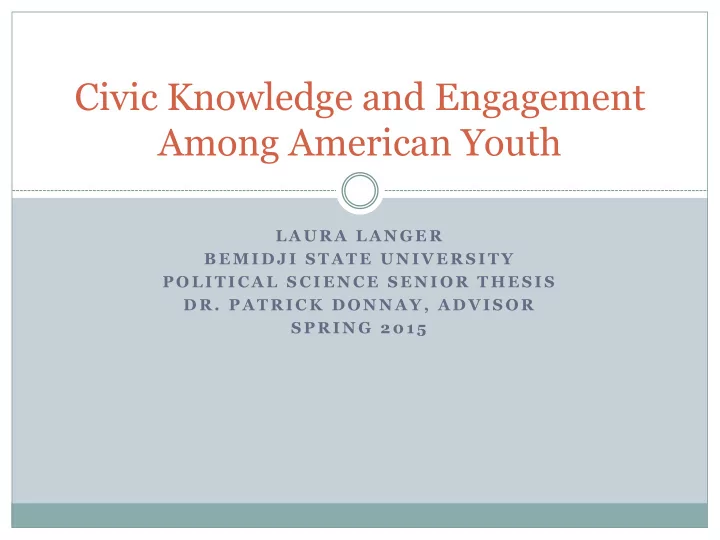

Civic Knowledge and Engagement Among American Youth L A U R A L A N G E R B E M I D J I S T A T E U N I V E R S I T Y P O L I T I C A L S C I E N C E S E N I O R T H E S I S D R . P A T R I C K D O N N A Y , A D V I S O R S P R I N G 2 0 1 5
Research Question and Thesis Statement Research question: Can the US increase civic knowledge and engagement among American youth by increasing civic education courses within the US education system? Thesis statement: In order to increase civic knowledge and engagement , the US must start by requiring civics education, including classes, volunteering opportunities, and extracurricular participation within schools across the US. We also must address the socioeconomic issues that magnify the engagement discrepancies.
Literature Review Reviewed literature that focused on: Civic education International Foundation for Electoral Systems, 2012 – defines civic education It is meant to develop three fundamentals of democratic citizenship. Civic disposition Civic knowledge Civic skills
Literature review Extracurricular involvement and volunteering in the community Hart, 2007 – explains why these two aspects are important Service learning has been shown to be important in developing a more politically aware and active participant in civic duties Extracurricular activities develop skills in public speaking, influencing others, holding meetings, and writing formal documents
Literature review Socioeconomic status (SES) American Psychological Association, 2014 – defines SES SES measures a combination of education, income, and occupation Political socialization Dudley, R. L., & Gitelson, A. R. (2002) – defines and explains the importance of political socialization The learning of social patterns corresponding to social positions as mediated through various agencies of society • Three agents of the process: Family/parents School Peer groups
Hypotheses Hypothesis I: In a comparison of individuals, those that do not discuss politics with their parents/guardians but take a civics course will be more likely to vote than those that do not have that class Hypothesis II: In a comparison of individuals, those who are underrepresented politically are likely to vote if they have taken a civics course than those that have not Hypothesis III: In a comparison of individuals, those that did not participate in extracurricular activities are more likely to vote if they had a civics course in high school than those that did not take a civics course
CIRCLE data Center for Information and Research on Civic Learning and Engagement Questioned 4,483 American citizens from ages 18 to 24 Independent variables: Civics education course in high school Class activities Dependent variables: Voting in the 2012 national election Control variables: Group participation Race of respondent Discuss politics with parents
Hypothesis I 12.6 pts 11.38 pts .63 pts 8.12 pts 16.68 pts
Hypothesis II 12.91 pts 10.92 pts 14.04 13.79 pts pts 3.72 pts
Hypothesis III Did you take a civics course in high How many groups in high school did you participate in? school? 1 group 2-3 groups 4-5 groups 6-9 groups 10 groups or more Yes Did you vote Yes 203 276 255 76 16 in the 2012 60.2% 64.5% 76.8% 78.4% 66.7% national No 134 152 77 21 8 election? 38.9% 35.5% 23.3% 21.6% 33.3% Total 337 428 332 97 24 100.0% 100.0% 100.0% 100.0% 100.0% No Did you vote Yes 21 50 25 9 3 in the 2012 42.9% 59.5% 61.0% 69.2% 75.0% national No 28 34 16 4 1 election? 57.1% 40.5% 39.0% 30.8% 25.0% Total 49 84 41 13 4 100.0% 100.0% 100.0% 100.0% 100.0% Chi-Square: [YES] 28.287 [YES – Approx. Sig.] .000 [NO] 5.773 [NO – Approx. Sig.] .217 Cramer’s V: [YES- Value] .151 [YES - Approx. Sig.] .000 [NO – value] .174 [NO – Approx. Sig.] .217
Summary of my Results Civics education increases likelihood to vote Civics education helps to become more informed Disadvantaged youth benefit from civics education more than advantaged youth Family transmission occurs less among disadvantaged groups
Recommend
More recommend